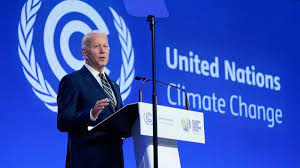Some fundamental differences, including over money, divide the leaders heading to Glasgow.
前往格拉斯哥的各国领导人之间存在一些根本分歧,包括金钱上的。
The outcome will determine, to a large extent, how humanity will survive on a hotter planet.
结果将在很大程度上决定,人类将如何在一个更热的星球上生存。
The future is on the line.
未来岌岌可危。

As presidents and prime ministers arrive in Glasgow this week for a pivotal climate summit,
当各国总统和首相本周抵达格拉斯哥参加这个关键的气候峰会时,
the outcome will determine, to a large extent, how the world’s seven billion people will survive on a hotter planet
结果将在很大程度上决定,世界上70亿人将如何在一个更热的星球上生存
and whether far worse levels of warming can be averted for future generations.
以及未来几代人能否避免更严重的气候变暖。
Already, the failure to slow rising temperatures — brought on by the burning of oil, gas and coal — has led to deadly floods, fires, heat, and drought around the world.
由于石油、天然气和煤炭的燃烧,未能减缓气温不断上升,已经在世界各地导致了致命的洪水、火灾、高温和干旱。
It has exposed a gaping chasm between the scientific consensus,
它暴露了科学共识之间的鸿沟,
which says humanity must rapidly reduce the emissions of planet-warming greenhouse gases to avert climate catastrophe,
科学共识认为,人类必须迅速减少导致地球变暖的温室气体的排放,以避免气候灾难,
and what political leaders and many corporate executives have been willing to do.
这是政治领导人和许多企业高管一直愿意做的事情。
“That we are now so perilously close to the edge for a number of countries is perhaps the tragedy of our times,”
“对于一些国家来说,我们现在如此危险地接近边缘,也许是我们这个时代的悲剧,”
said Mia Mottley, the prime minister of Barbados, in an interview.
巴巴多斯总理米娅·莫特利在接受采访时说。
Tensions loom over the 12-day summit.
紧张的气氛笼罩着为期12天的峰会。
Some poor countries hard hit by climate disasters are holding out for money promised, and yet to be delivered, by the industrialized nations that fueled the crisis.
一些遭受气候灾害严重打击的贫穷国家正在坚持要求工业化国家承诺的、但尚未兑现的资金。工业化国家曾为这场危机火上浇油。
Polluting countries are pressing each other to cut their emissions while jockeying for advantage and wrestling with the impacts on their own economies.
污染国家在相互施压要求减排的同时,也在为获得利益而用尽手段,并努力应对其对本国经济的影响。
Complicating matters, the need for collective action to tackle such an urgent, existential global threat comes at a time of rising nationalism.
更复杂的是,在民族主义抬头之际,需要采取集体行动来应对这种紧迫的、关乎生死存亡的全球威胁。
This makes the talks in Glasgow a test of whether global cooperation is even possible to confront a crisis that does not recognize national borders.
这使得格拉斯哥的会谈成为一个考验,看看全球合作是否有可能应对不分国界的危机。
“I don’t think you can solve the climate crisis on your own as a nationalist leader,”
“我认为,作为一个民族主义领导人,光靠自己是无法解决气候危机的,”
said Rachel Kyte, a former United Nations official and now dean of the Fletcher School at Tufts University.
前联合国官员、塔夫茨大学弗莱彻学院院长雷切尔·凯特说。
“You depend on the actions of others.”
“你要依靠别人的行动。”
The science is clear on what needs to be done.
科学明确了需要做什么。
Emissions of carbon dioxide, methane and other greenhouse gases driving up global temperatures need to be cut by nearly half by 2030, less than a decade.
二氧化碳、甲烷和其他导致全球气温上升的温室气体的排放需要在不到十年的时间内,到2030年减少近一半。
In fact, they are continuing to grow.
事实上,气温还在继续上升。
The World Meteorological Organization warned last week
世界气象组织于上周发出警告
that the amount of heat-trapping greenhouse gases in the atmosphere had reached a record high in 2020 despite the pandemic and is rising again this year.
尽管新冠疫情爆发,但大气中吸热的温室气体数量在2020年达到了创纪录的水平,今年气温又在上升。
As a result, the average global temperature has risen by more than 1 degree Celsius since the Industrial Revolution.
因此,自工业革命以来,全球平均气温上升了1摄氏度以上。
The scientific consensus says that if it rises by 1.5 degrees Celsius, or 2.7 degrees Fahrenheit,
科学共识认为,如果气温上升1.5摄氏度,或2.7华氏度,
it will significantly increase the likelihood of far worse climate catastrophes that could exacerbate hunger, disease and conflict.
这将大大增加发生更严重的气候灾难的可能性,从而加剧饥饿、疾病和冲突。
Limiting temperature rise to within the 1.5 degree Celsius threshold has become something of a rallying cry for many powerful countries, including the United States.
把气温上升限制在1.5摄氏度以内,已经成为包括美国在内的许多大国的战斗口号。
That is not within reach: Even if all countries achieve the targets they set for themselves at the 2015 Paris Agreement,
这是不可能实现的:即使所有国家都实现了在2015年《巴黎协定》中为自己设定的目标,
average global temperatures are on track to rise by 2.7 degrees Celsius by the end of the century.
到本世纪末,全球平均气温将上升2.7摄氏度。












